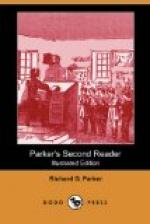Hast thou not set at defiance my authority; violated the public peace, and passed thy life in injuring the persons and properties of thy fellow-subjects?
O, it was impious; it was unmanly; it was poor and pitiful!
Have not you too gone about the earth like an evil genius; blasting the fair fruits of peace and industry; plundering, ravaging, killing, without law, without justice, merely to gratify an insatiable lust for dominion?
What a glorious monument of human invention, that has thus triumphed over wind and wave; has brought the ends of the earth in communion; has established an interchange of blessings, pouring into the sterile regions of the north all the luxuries of the south; diffused the light of knowledge and the charities of cultivated life; and has thus bound together those scattered portions of the human race, between which Nature seemed to have thrown an insurmountable barrier!
LESSON LX.
The Colon.
THE COLON consists of two periods placed one above the other, thus =:=
Sometimes the passage ending with a colon is to be read with the voice suspended; but it should generally be read with the falling inflection of the voice.
The general rule, when you come to a colon, is to stop just long enough to count three; or three times as long as you are directed to pause at a comma.
EXAMPLES.
Law and order are forgotten: violence and rapine are abroad: the golden cords of society are loosed.
The temples are profaned: the soldier’s curse resounds in the house of God: the marble pavement is trampled by iron hoofs: horses neigh beside the altar.
Blue wreaths of smoke ascend through the trees, and betray the half-hidden cottage: the eye contemplates well-thatched ricks, and barns bursting with plenty: the peasant laughs at the approach of winter.
[The following passages
ending with a colon are to be
read with the voice
suspended:]
Do not flatter yourselves with the hope of perfect happiness: there is no such thing in the world.
A boy at school is by no means at liberty to read what books he pleases: he must give attention to those which contain his lessons; so that, when he is called upon to recite, he may be ready, fluent, and accurate, in repeating the portion assigned him.
As we perceive the shadow to have moved along the dial, but did not perceive its moving; and it appears that the grass has grown, though nobody ever saw it grow: so the advances we make in knowledge, as they consist of such minute steps, are perceivable only by the distance gone over.
When the proud steed shall know why man restrains his fiery course, or drives him o’er the plains; when the dull ox, why now he breaks the clod, is now a victim, and now Egypt’s god: then shall man’s pride and dullness comprehend his actions’, passions’, being’s use and end.




